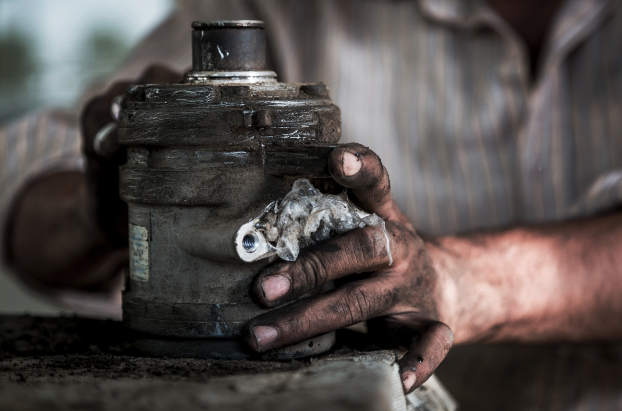Most mechanics spend hours every day soaking, brushing, and cleaning brake, engine, and transmission parts. Safety-Kleen, Zepp, and other brands of parts washers have sold hundreds of thousands of tanks over the years. Some shops filled the tanks with gasoline or mineral spirits. Safety-Kleen’s Solvent 105 was very popular. Unfortunately, all of these liquids contained benzene, a known carcinogen that causes leukemia.
Safety-Kleen & Benzene
Safety-Kleen 105 Solvent is a mineral spirits petroleum-based hydrocarbon designed to clean automotive parts. It is advertised as a convenient, safe, and economical way to clean greasy metal parts.
Benzene evaporates at room temperature. When parts are being cleaned, benzene can be inhaled. This cleaner was often used to wash dirty hands, exposing skin to benzene. Cuts or scrapes on your hands make benzene exposures far worse.
Warnings About Benzene in Safety-Kleen Products
Safety-Kleen has sold and serviced parts washers and solvents for decades. Lawyers for Safety-Kleen argue that their products contain sufficient warnings. But ask a mechanic if their Safety-Kleen representative ever directed them to wear a respirator while using a parts washer and the answer is almost always “no”. Safety-Kleen was aware of the hazards of benzene but did not properly warn their customers.
Need Our Help? Contact Us Today!
Parts Washers – Exposure to Benzene
By the early 1970s, over 100,000 Safety-Kleen parts cleaners had been sold to auto shops and other customers in the United States. A truck would pull up, haul the old solvent away and replace it with new or recycled solvent. Benzene in the tank would evaporate into the breathing space of mechanics working with the washer. Using the brush that came with most tanks stirred up even more vapors. And placing parts contaminated with gasoline or oil would add even more benzene to the system.
Aggressive Benzene Lawyers
Benzene lawsuits are complex and time consuming. Typical defendants in benzene cases are petrochemical giants who will deny virtually everything. If you or a loved one have been diagnosed with acute myeloid leukemia, multiple myeloma, myelodysplastic syndrome, or non-Hodgkin’s lymphoma, please call our law offices. We are here to fight on your behalf, and demand the compensation you deserve. We will be by your side throughout the case, we will answer all your questions, and you will always know what to expect next.
Contact us online today or call 1-800-BENZENE to speak with one of our attorneys.



